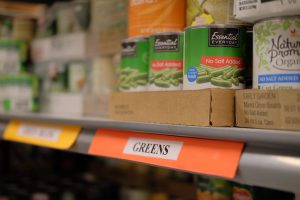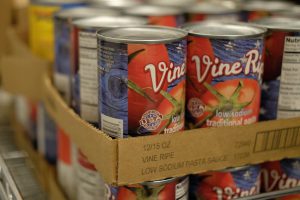“We treat everyone here with the same dignity and equity as we would want for ourselves, because we could be in their shoes one day.” This is the core message that Hannah Spanner wants to get across to me during a recent interview. Hannah runs the weekly food pantry at Faith United Methodist Church, which receives food from the Capital Area Food Bank through an organization called Community Support Systems Inc.

It’s a rainy Friday in Accokeek, Maryland and 50-60 families have braved the weather to come through the Pantry. They come to gain access to a variety of nutritious, healthy food. Hannah says that Community Support Systems prides itself on choice—the ability for guests to choose what foods they want, rather than receiving a pre-packaged bag.
“The way it’s set up, they go around just like they are in a grocery store. It’s more personal here and the guests appreciate it.”
Guests like Roslee Y., a 56-year-old mother who supports three children living under her roof—a young daughter and two grandchildren. A few years ago, Roslee suffered a physical setback and was paralyzed for six months. Though she recovered enough to walk again, she remains on disability and is unable to work. With disability benefits as the only source of income for her family, Roslee often has to make difficult sacrifices: sometimes paying for food means not paying a household bill.
But Roslee recently found the Food Pantry and continues to attend because it helps her make sure her children grow up strong and healthy, and because of the dignity she is afforded. Roslee loves that the Food Pantry provides her with choice—something that is especially necessary for her because she can’t eat foods high in Vitamin K due to a blood disease she battles.
Another client, Roy G., was recently laid off from his job due to a disability. While he would love to continue working, he too has had many physical setbacks that make finding work difficult. The support he receives from the Food Pantry is crucial for him to maintain both his health, and that of his 80-year-old neighbor with Alzheimer’s, whom he helps care for.
Roslee, Roy and the other guests make their way through the Food Pantry over the course of a two-hour time span. They choose from an assortment of vegetables, fruits, breads, pasta, grains and more, and leave with food to see them through much of the month ahead—a fact that makes Hannah quite proud.
“We divvy up all our food to make sure there will be the same amount for everyone,” she says. “Everyone leaves here with an equitable amount of food.”
To Hannah, that equity–and the experience of choosing one’s own food—is what it’s all about when offering dignity to a community in need.



